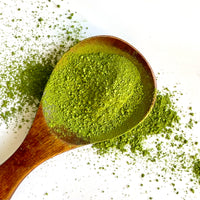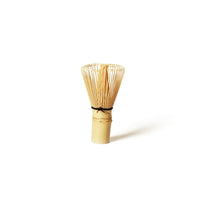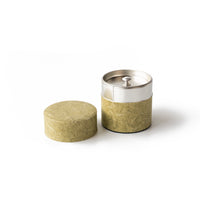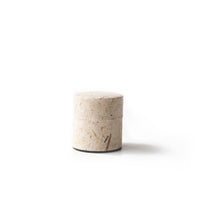Organic Ceremonial Matcha from Kagoshima








Organic Ceremonial Matcha from Kagoshima
This beautifully rounded organic matcha offers a creamy, smooth tasting experience, taking you to the heart of Japan's ancient tea culture.
A single-estate blend of Yabukita, Sae midori and Okumidori cultivars, the leaves are selected and processed by skilled tea masters.
One of the few organically grown matchas currently available in the world, the trees are grown in rich fertile soil and covered for 20-30 days using a traditional 'tana' method.
Produced with considerable skill and dedication, this ceremonial grade matcha may accompany you during those special moments.
Expertly produced by Kumiko Koga.
Packed by us in Elegant Japanese Washi paper bags :) We also offer refill in our home-compostable bags.
Kagoshima, Kyushu (Japan)
Artichoke, moss, toasted hazelnut.
Smooth balance of mellow sweetness and hint of bitterness.
Usucha - Thin (1 cup)
2g / 1 tsp / 2 chashaku
70ml / 80 °C
Koicha - Thick (1 cup)
4g / 2 tsp / 4 chashaku
50ml / 80 °C
Sieve into the bowl to remove lumps and to get best results. Use a chasen (whisk) to mix the tea. Follow our brewing guide.
Introducing
Ceremonial Grade Matcha
Steeped in a vibrant and dramatic history that spans centuries, Matcha has become synonymous with Japan - the bright green powder now a staple at many coffee shops. Voyaging through the highs and lows of the samurai Shogunate, matcha is deeply embedded in the politics, culture, and spirituality of Japan.
Like loose leaf tea, the quality of matcha is very important and we recommend choosing well in order to really appreciate the best of what matcha can offer. Lower quality matchas will be more bitter and will lack in quality and freshness of flavour. For cooking we recommend using culinary grade matcha. The ceremonial grade matcha that we provide is made to the highest standards and can be enjoyed both daily or ceremonially.
Matcha is conventionally prepared in a tea bowl instead of the usual cups used for other teas, due to the brewing method. For one serving use approximately 1/2 teaspoon of powder to the tea bowl with 80ml of water, and whisk to generate a fine froth on top. For a stronger drink add 1 teaspoon of matcha. Make it into a creamy latte by adding steamed plant or dairy milk.
You can view our brewing guide here. Due to being powdered, matcha spoils much more easily than other teas and should be consumed quickly after opening. View storage instructions here.
Chado / Tea Ceremony
Chado, or "the Way of Tea," is a traditional Japanese tea ceremony that emphasises four key qualities: harmony, respect, purity, and tranquility.
Rooted in Zen Buddhism, it transforms the simple act of preparing and drinking matcha into a meditative ritual. Each ceremony is unique, reflecting the seasons and the individual host's spirit, creating a space for mindfulness and connection. Chado is not just about the tea itself, but also about cultivating an inner calm and a sense of community.
The history of chado can be traced back to the 9th century, with influences from Chinese tea culture. However, it began to evolve significantly in Japan during the 12th century when Zen monks introduced tea as a way to enhance meditation. In the 15th century, the aesthetic and philosophical elements of the ceremony were further refined by tea masters like Sen no Rikyū. He emphasised simplicity, natural beauty, and the spiritual aspects of the practice, laying the groundwork for the modern tea ceremony.
Ceremony of the Moment
During the Edo period (1603-1868), chado became more formalised and widely practiced among the samurai and merchant classes, integrating elements of hospitality and art. The design of tea rooms, the choice of utensils, and the selection of seasonal decor all became significant aspects of the ceremony.
Today, chado continues to be a respected cultural practice, embodying Japanese aesthetics and values, and is often seen as a means of personal and communal expression.
We believe Chado to be a gateway into the personal discovery of what Ceremony can mean in our every-day. Moving with intention and mindfulness, we can act meaningfully and flow with the rituals of life.








